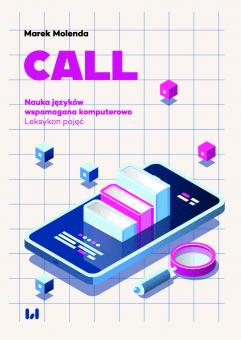-
2319
-
1850
-
1744
-
1243
-
1223
CALL. Nauka języków wspomagana komputerowo
Leksykon pojęć

Pliki do pobrania
Książka ta pełni rolę podręcznego leksykonu najważniejszych pojęć związanych z nauczaniem języków wspomaganym komputerowo (CALL). Jest ona skierowana przede wszystkim do osób nauczających języków obcych, ale wiele opisanych w niej rozwiązań można z powodzeniem zastosować w nauczaniu języka rodzimego. Każde z uporządkowanych alfabetycznie haseł zawiera krótkie wyjaśnienie wybranego pojęcia oraz – tam, gdzie było to możliwe – informacje o wynikach badań z zakresu skuteczności zastosowania danego rozwiązania do nauczania języka. Wiele haseł zawiera propozycje darmowych narzędzi oraz pomysły na ćwiczenia do wdrożenia w klasie lub w samodzielnym nauczaniu opisane w sekcji „Jak zacząć?”.
Publikacja współfinasowana przez Unię Europejską ze środków Europejskiego Funduszu Społecznego w ramach Programu Operacyjnego Wiedza Edukacja Rozwój Projekt „Modelowe kształcenie przyszłych nauczycieli przedmiotów humanistycznych w Uniwersytecie Łódzkim” Nr POWR.03.01.00-IP.08-00-PKN/18
Balıkcıoğlu Akkuş, G., Akkuş, M. & Yapıcı, E. (2022). An investigation into English instructors’ anxiety in synchronous online teaching platforms. Language and Technology, 4(1), 15–29. https://doi.org/10.55078/lantec.1152545
Barrot, J. S. (2021). Effects of Facebook-based e-portfolio on ESL learners’ writing performance. Language, Culture and Curriculum, 34(1), 95–111. https://doi.org/10.1080/07908318.2020.1745822
Bax, S. (2003). CALL—past, present and future. System, 31, 13–28. https://doi.org/10.1016/S0346-251X(02)00071-4
Bąkała, A. & Molenda, M. (2020). Using Moodle as a response system for higher education in Poland: Benefits and challenges. Informatyka Ekonomiczna. Business Informatics, 4(58), 33–49.
Beauchamp, G. & Parkinson, J. (2005). Beyond the ‘wow’ factor: developing interactivity with the interactive whiteboard. School Science Review, 86(316), 97–103.
Benjamin, A. & Crow, J. T. (2013). Vocabulary at the Core: Teaching the Common Core Standards. Routledge.
Blázquez-Carretero, M. & Woore, R. (2021). Can a ‘pedagogical’ spellchecker improve spelling accuracy in L2 Spanish? Language Learning & Technology, 25(2), 135–157.
Chapelle, C. A. (2003). English Language Learning And Technology: Lectures on Applied Linguistics in the Age of Information and Communication Technology. John Benjamins.
Chojnacki, L. (b.d.). e-nauczanie. https://www.enauczanie.com
Cong-Len, N. (2018). Web-based language learning (WBLL) for enhancing L2 speaking performance: A review. Advances in Language and Literary Studies, 9(4), 143–152. http://dx.doi.org/10.7575/aiac.alls.v.9n.4p.143
Cotter, T. (b.d.). Planning a grammar lesson. British Council. https://www.teachingenglish.org.uk/article/planning-grammarlesson
Cowie, A. P. (2009). The Oxford History of English Lexicography. Tom II. Oxford University Press.
Cross, S., Sharples, M. & Healing, G. (2015). E-pedagogy of Handheld Devices 2013 Survey: Patterns of Student Use for Learning. The Open University.
Czetwertyńska, G. (2021). W poszukiwaniu kompasu, czyli po co nam projekty w edukacji językowej. Języki Obce w Szkole, 4(21), 5–10. https://doi.org/10.47050/jows.2021.4.5-10
„Czym jest e-twinning?” (b.d.). Komisja Europejska. https://school-education.ec.europa.eu/pl/etwinning (dostęp 3.11.2022).
DanMun [pseudonim] (2015). My parents love Venice… Wpis na platformie reddit. https://www.reddit.com/r/gaming/comments/1h2iud/my_grandparents_love_venice_so_i_let_them_play/
Davies, G., Otto, S. E. K. & Rüschoff, B. (2013). Historical perspectives on CALL. W: M. Thomas, H. Reinders & M. Warschauer (red.), Contemporary Computer-Assisted Language Learning. Bloomsbury.
Filipiak, E. (2011). Z Wygotskim i Brunerem w tle: Słownik pojęć kluczowych. Wydawnictwo Uniwersytetu Kazimierza Wielkiego.
Gajek, E. & Michońska-Stadnik, A. (red.) (2017). Strategie uczenia się języków w środowisku cyfrowym. Instytut Lingwistyki Uniwersytetu Warszawskiego.
Garrison, D. R., Anderson, T. & Archer, W. (2000). Critical inquiry in a text-based environment: Computer conferencing in higher education. The Internet and Higher Education, 2(2–3), 87–105.
Grey, CGP [pseudonim] (2012). Digital Aristotle: Thoughts on the future of education. Wideo na platformie YouTube. https://www.youtube.com/watch?v=7vsCAM17O-M
Guth, S. & Helm, F. (red.) (2010). Telecollaboration 2.0: Language, Literacies and Intercultural Learning in the 21st Century. Peter Lang.
Han, J. (2012). Emerging technologies: Robot-assisted language learning. Language Learning & Technology, 16(3), 1–9.
Harasim, L., Hiltz, S. R., Teles, L. & Turoff, M. (1995). Learning Networks: A Field Guide to Teaching and Learning Online. MIT Press.
Hauck, M. & Wernecke, S. (2013). Materials design in CALL: Social presence in online environments. W: M. Thomas, H. Reinders & M. Warschauer (red.), Contemporaty Computer-Assisted Language Learning. Bloomsbury.
Heift, T. & Vyatkina, N. (2017). Technologies for teaching and learning L2 grammar. W: C. A. Chapelle & S. Sauro (red.), The Handbook of Technology and Second Language Teaching and Learning. John Wiley & Sons.
Hillis, W. D. (2000). “Aristotle” (the knowledge web). Edge. https://www.edge.org/conversation/w_daniel_hillis-aristotle-the-
knowledge-web
Hodges, C., Moore, S., Lockee, B., Trust, T. & Bond, A. (2020). The difference between emergency remote teaching and online learning. Educase Review. https://er.educause.edu/articles/2020/3/the-difference-between-emergency-remote-teaching-and-online-learning
Hubbard, P. (2017). Technologies for teaching and learning L2 listening. W: C. A. Chapelle & S. Sauro (red.), The Handbook of Technology and Second Language Teaching and Learning. John Wiley & Sons.
Hulstijn, J. H. & Laufer, B. (2001). Some empirical evidence for involvement load hypothesis in vocabulary acquisition. Language Learning, 51, 539–558.
Humblé, P. (2001). Dictionaries and Language Learners. Haag & Herchen.
Jankowski, T. (b.d.). Wpis na blogu E-learning – notatki projektanta. https://www.jankowskit.pl/
Jenson, J. D. & Treuer, P. (2014). Defining the e-portfolio: What it is and why it matters. Change: The Magazine of Higher Learning, 46(2), 50–57. https://doi.org/10.1080/00091383.2014.897192
Kan, Q. & Tang, J. (2018). Researching mobile-assisted English language learning among adult distance learners in China. International Journal of Computer-Assisted Language Learning and Teaching, 8(3), 1–28. https://doi.org/10.4018/ijcallt.2018070101
Karcan, G. C. & Akoğlu, K. (2021). Educational augmented reality technology for language learning and teaching: A comprehensive review. Shanlax International Journal of Education, 9(2), 68–79. https://doi.org/10.34293/education.v9i2.3715
Kessler, G., Healey, D., Hubbard, P., Hanson-Smith, E., Ware, P. & Iannou-Georgiou, S. (2011). TESOL Technology Standards: Description, Implementation, Integration.
Komorowska, H. (2005). Dydaktyka nauczania języków obcych. Fraszka Edukacyjna.
Kordus, M. (2021). Międzynarodowa przygoda – projekt z eTwinning krok po kroku. Języki Obce w Szkole, 4(21), 41–46. https://doi.org/10.47050/jows.2021.4.41-46
Krashen, S. (1977). Some issues relating to the monitor model. W: H. Brown, C. Yorio & R. Crymes (red.), Teaching and Learning English as a Second Language: Trends in Research and Practice: on TESOL ‘77: Selected papers from the eleventh annual convention of teachers of English to speakers of other languages, Miami, Florida, April 26 – May 1, 1977. Teachers of English to Speakers of Other Languages.
Kukulska-Hulme, A. & Shield, L. (2008). An overview of mobile assisted language learning: From content delivery to supported collaboration and interaction. ReCALL, 20(3), 271–289.
Lai, C., Ni, R. & Zhao, Y. (2013). Digital games and language learning. W: M. Thomas, H. Reinders & M. Warschauer (red.), Contemporary Computer-Assisted Language Learning. Bloomsbury.
Laningham, S. (2006). Developer works: Interviews Tim Berners-Lee. https://www.ibm.com/developerworks/podcast/dwi/cm-int082206txt.html
Lege, R., Bonner, E., Frazier, E. & Pascucci, L. (2020). Pedagogical considerations for successful implementation of virtual reality in the language classroom. W: M. Kruk & M. Peterson (red.), New Technological Applications for Foreign and Second Language Learning and Teaching. Information Science Reference.
Levak, N. & Son, J. B. (2017). Facilitating second language learners’ listening comprehension with Second Life and Skype. ReCALL, 29(2), 200–218.
Levis, J. M. (2005). Changing contexts and shifting paradigms in pronunciation teaching. TESOL Quarterly, 39(3), 369–377. https://doi.org/10.2307/3588485
Liaw, M.-L. & English, K. (2017). Technologies for teaching and learning L2 reading. W: C. A. Chapelle & S. Sauro (red.), The Handbook of Technology and Second Language Teaching and Learning. John Wiley & Sons.
Lin, P. H., Liu, T. C. & Paas, F. (2017). Effects of spell checkers on English as a second language students’ incidental spelling learning: A cognitive load perspective. Reading and Writing 30, 1501–1525. https://doi.org/10.1007/s11145-017-9734-4
Long, M. & Robinson, P. (1998). Focus on form: Theory, research, and practice. W: C. Doughty & J. Williams (red.), Focus on Form in Classroom Second Language Acquisition. Cambridge University Press.
Lotherington, H. (2016). What’s app? Negotiating the good, bad, and ugly of apps for (English and other) language learning. Konferencja Canadian society for the study of education/ language and literacy researchers of Canada.
Ma, Q. (2017). Technologies for teaching and learning L2 vocabulary. W: C. A. Chapelle & S. Sauro (red.), The Handbook of Technology and Second Language Teaching and Learning. John Wiley & Sons.
Malik, A. (2022). Meta is developing a web version of Horizon Worlds. Tech Crunch. https://techcrunch.com/2022/04/15/meta-developing-web-version-horizon-worlds/?guce_referrer=aHR0cHM6Ly93d3cuZ29vZ2xlLmNvbS8&guce_referrer_sig=AQAAAGV_JuZjYJMhkyLLlsqzQIIWXMUb_dQBuq_LTEx7u2kPYcE1w0m2_gG48a3BbqqcyqNMDtT5BYgwCfJOPLM9SWlJ-wooPdEOTT47y-_IWVLQg0kCbcZmQZaZsTjcTV2kxjmM2oBjbGng4WPHIDP1a6XMCOFMDa279tpuwjNcgIQp&guccounter=2
Maruf, R. (2022). Google fires engineer who contended its AI technology was sentient. CNN Business. https://edition.cnn.com/2022/07/23/business/google-ai-engineer-fired-sentient/index.html
Mielnik, K. (2020). Dobre praktyki i wyzwania w zakresie wykorzystania technologii informacyjnej w nauczaniu języków obcych. Ośrodek Rozwoju Edukacji.
Molenda, M. (2022). Investigating the process of EFL lexicogrammatical consultation in the Web 2.0 environment. Niepublikowana rozprawa doktorska. Uniwersytet Łódzki.
Molenda, M. & Grabarczyk, I. (2022). Microsoft Reading Progress as CAPT tool. Research in Language, 20(2), 197–214. https://doi.org/10.18778/1731-7533.20.2.05
Molenda, M., Pęzik, P. & Osborne, J. (2018). Self-repetitions in learners’ spoken language: A corpus-based study. W: V. Brezina & L. Flowerdew (red.), Corpus Research New Perspectives and Applications. John Benjamins.
Murray, D. (1972). Teach writing as a process not product. W: R. Graves (red.), Rhetoric and Composition: A Sourcebook for Teachers and Writers. Boynton/Cook.
Niksa, T. (2015). Moduł Warsztaty – narzędzie w procesie edukacji na uczelni wyższej. E-mentor, 2(59), 35–39. https://doi.org/10.15219/em59.1168
O’Dowd, R. (2013). Telecollaboration and CALL. W: M. Thomas, H. Reinders & M. Warschauer (red.), Contemporary Computer-Assisted Language Learning. Bloomsbury.
Oksuz-Zerey, M. (2021). Perceived benefits of WhatsApp voice messaging: Investigating EFL students’ experiences. European Journal of English Language Teaching, 6(3). http://dx.doi.org/10.46827/ejel.v6i3.3635
O’Reilley, T. (2005). What is Web 2.0. O’Reilly media. https://www.oreilly.com/pub/a/web2/archive/what-is-web-20.html
Ostrowska, B. & Mankiewicz, L. (2020). Ocenianie w edukacji hybrydowej. Superbelfrzy RP. https://www.superbelfrzy.edu.pl/hybrydowa/ocenianie-w-edukacji-hybrydowej/
Papadopoulos, P. M., Natsis, A., Obwegeser, N., & Weinberger, A. (2018). Enriching feedback in audience response systems: Analysis and implications of objective and subjective metrics on students’ performance and attitudes. Journal of Computer Assisted Learning, 35(2), 1–12. https://doi.org/10.1111/jcal.12332
Pęzik, P. (2016a). Exploring phraseological equivalence with Paralela. W: E. Gruszczyńska, A. Leńko-Szymańska (red.), Polish-Language parallel corpora. Instytut Lingwistyki Stosowanej UW.
Pęzik, P. (2016b). Towards the PELCRA Learner English Corpus. W: P. Pęzik (red.), Corpus Data Across Languages and Disciplines. Peter Lang.
Philips, B. (2017). Student-produced podcast in language learning – Exploring student perceptions od podcast activities. IAFOR Journal of Education, 5(3), 157–171.
Polański, E. (red.) (2021). Wielki słownik ortograficzny języka polskiego. Wydawnictwo Naukowe PWN.
Prizel-Kania, A. (2017). Nauczanie języka polskiego jako obcego wspomagane komputerowo – badanie opinii nauczycieli. Języki Obce w Szkole, 1, 88–92.
„Próba pokazu slajdów z trenerem prelegenta” (b.d.). https://support.microsoft.com/pl-pl/office/pr%C3%B3ba-pokazu-slajd%C3%B3w-z-trenerem-prelegenta-cd7fc941-5c3b-498c-a225-83ef3f64f07b#ID0EDBP=Web
Race, P. (2015). The Lecturer’s Toolkit: A Practical Guide to Assessment, Learning and Teaching. Routledge.
Razagifard, P. (2013). The impact of text-based CMC on improving L2 oral fluency. Journal of Computer Assisted Learning, 29(3), 270–279.
Riano, A. & Margolin, S. J. (2017). But spell checker always corrects witch words eye misspelled: Spell checker use among good and poor spellers. Written Language and Literacy, 20(2), 129–146. https://doi.org/10.1075/wll.00001.ria
Rimbar, H. (2017). The influence of spell-checkers on students’ ability to generate repairs of spelling errors. Journal of Nusantara Studies (JONUS), 2(1), 1–12. https://doi.org/10.24200/jonus.vol2iss1pp1-12
Robinson, P. & Ellis, N. C. (red.) (2008). Handbook of Cognitive Linguistics and Second Language Acquisition. Routledge.
Rogerson-Revell, P. M. (2021). Computer-Assisted Pronunciation Training (CAPT): Current issues and future directions, RELC Journal, 52(1), 189–205. https://doi.org/10.1177/0033688220977406
Rozkosz, E. (2017). Teoria Etienne’a Wengera w badaniach usytuowanego uczenia się kompetencji informacyjnych. Forum Oświatowe, 29(1), 109–140.
Róg, T. (2021). Podejście zadaniowe – założenia teoretyczne i rozwiązania praktyczne. Języki Obce w Szkole, 4, 97–108. https://doi.org/10.47050/jows.2021.4.97-108
Sadler, R. & Dooly, M. (2013). Language learning in virtual worlds: Research and practice. W: M. Thomas, H. Reinders & M. Warschauer (red.), Contemporary Computer-Assisted Language Learning. Bloomsbury.
Salmon, G. (2002). Eticities: The Key to Active Online Learning. Kogan Page.
Satar, H., & Özdener, N. (2008). The effects of synchronous CMC on speaking proficiency and anxiety: Text versus voice chat. The Modern Language Journal, 92(4), 595–613.
Searle, J. R. (1975). A taxonomy of illocutionary acts. Language, Mind and Knowledge, Minnesota Studies in the Philosophy of Science, 7, 344–369.
„Second Life jako przykład wykorzystania VR w nauczaniu języka obcego” (b.d.). Wyższa Szkoła Bankowa we Wrocławiu [kurs online]. https://oze.wsb.wroclaw.pl/course/view.php?id=40
Shamesh, H. (2023). The ultimate guide for using Chat GPT for English learning. Hadar Shamesh. https://hadarshemesh.com/magazine/chatgpt-for-learning-english/
Sharma, P. & Barrett, B. (2007). Blended Learning: Using Technology in and beyond the Language Classroom. Macmillan.
Short, J., Williams, E. & Christie, B. (1967). The Social Psychology of Telecommunications. John Wiley & Sons.
Soleimani, H. (2022). Computer Assisted Language Learning: Theory and Practice. Payame Noor University Press.
Suh, S., Kim, S. W., & Kim, N. J. (2010). Effectiveness of MMORPG-based instruction in elementary English education in Korea. Journal of Computer Assisted Learning, 26(5), 370–378.
Sykes, J. M. (2005). Synchronous CMC and pragmatic development: Effects of oral and written chat. CALICO Journal, 399–431.
Szybura, A. (2016). Kasia to nie kaszia, czyli o tym, jak je rozróżnić. Dobra szkoła Nowy Jork. https://dobraszkolanowyjork.com/kasia-to-nie-kaszia-czyli-o-tym-jak-je-rozroznic
Topol, P. (2011). Nauka języka w Second Life? Tak! Ale czym? (Wybór narzędzi). W: M. Dąbrowski & M. Zając (red.), Koncepcje i praktyka e-edukacji. Fundacja Promocji i Akredytacji Kierunków Ekonomicznych.
Topol, P. (2013). Środowisko akademickie w Second Life – grupy, kursy i programy akademickie. E-mentor, 5(30), 44–52.
Turula, A. (2023a). Z czatbotem – tam i z powrotem (1). Fundacja rozwoju innowacji edukacyjnych WIEM. https://www.fundacjawiem.com/post/z-czatbotem-tam-i-z-porotem-1
Turula, A. (2023b). Z czatbotem – tam i z powrotem (2). Fundacja rozwoju innowacji edukacyjnych WIEM. https://www.fundacjawiem.com/post/z-czatbotem-tam-i-z-powrotem-2
Vandergrift, L. & Goh, C. C. M. (2012). Teaching and Learning Second Language Listening: Metacognition Inaction. Routledge.
Vičič, P. (2022). Distance language-learning experiences during the COVID lockdown. Proceedings of the 5th International Conference Contemporary Challenges in LSP Teaching.
Walesiak, B. (2021). Mobile apps for pronunciation training: Exploring learner engagement and retention. W: A. Kirkowa, A. Henderson & J. Fouz-González (red.), English Pronunciation Instruction: Research-based Insights. John Benjamins.
Wang, C.-P., Lan, Y-L., Tseng, W.-T., Lin, Y.-T. R. & Gupta, K. C. L. (2020) On the effects of 3D virtual worlds in language learning – a meta-analysis. Computer Assisted Language Learning, 33(8), 891–915. https://doi.org/10.1080/09588221.2019.1598444
Warschauer, M. (1996). Computer assisted language learning: An introduction. W: S. Fotos (red.), Multimedia Language Teaching. Logos International.
Warschauer, M. & Healey, D. (1998). Computers and language learning: An overview. Language Teaching, 31, 57–71.
Yastrebova, E. B., Chigasheva, M. A. & Evteev, S. V. (2022). University language education: Lessons of forced transition to teaching online. The Education and Science Journal, 24(5), 11–40. https://doi.org/10.17853/1994-5639-2022-5-11-40
Licencja

Utwór dostępny jest na licencji Creative Commons Uznanie autorstwa – Użycie niekomercyjne – Bez utworów zależnych 4.0 Międzynarodowe.
Jak cytować
Dyscypliny
- Archeologia
- Bibliologia i informatologia
- Biologia
- Chemia
- Ekonomia i zarządzanie
- Etnologia i antropologia kulturowa
- Filologia polska
- Filologie obce
- Filozofia
- Fizyka
- Geografia
- Historia
- Językoznawstwo
- Judaica
- Kultura i sztuka
- Literaturoznawstwo
- Matematyka
- Pedagogika
- Podręczniki dla cudzoziemców
- Politologia i stosunki międzynarodowe
- Prawo
- Psychologia
- Socjologia
- Varia
- Otwarty dostęp
Seria
- 100 lat niepodległości
- Akademia Samorządowa
- Akademia Zarządzania i Finansów
- Aktywni (nie)pełnosprawni
- Analecta Literackie i Językowe
- Bałkany XX/XXI
- Bibliotheca Litteraria
- Bibliotheca Philosophica
- Biografia i Badanie Biografii
- Byzantina Lodziensia
- Contemporary Asian Studies Series
- Cyfryzacja
- Edukacja dla Mądrości
- Ekonomia
- Filmo!znawcy
- Finanse
- Gerontologia
- Interdyscyplinarne Studia Miejskie
- Interpretacje Literackie
- Jerzy Giedroyc i…
- Jerzy Giedroyc i Świadkowie Historii
- Jesień Życia?
- Językoznawstwo
- Judaica Łódzkie
- Jurysprudencja
- Kim Jest Człowiek?
- Kognitywistyka
- Komunikacja i Media
- Krótkie Wprowadzenie
- Kultura Literacka Łodzi
- Literaturoznawstwo. Sylwetki
- Łódzkie Studia z Językoznawstwa Angielskiego i Ogólnego
- Łódź w PRL. PRL w Łodzi
- Manufactura Hispánica Lodziense
- Marketing
- Monografie Sekcji Socjologii Niepełnosprawności PTS
- Nauka Sztuki – Sztuka Nauki
- Oblicza feminizmu
- Oblicza wojny
- Perspektywy Biograficzne
- Politologia
- Polska a Europa Środkowo-Wschodnia w XX wieku
- Polska Kultura Filmowa
- Prawo
- PRL. Biografie
- Projekt: Egzystencja i Literatura
- Psychologia Wszystkiego
- Research on Science & Natural Philosophy
- Romanistyka dla Teatru
- Series Ceranea
- Stała Konferencja Pedagogiki Społecznej pod Patronatem Komitetu Nauk Pedagogicznych PAN
- Sztuka-Media-Kultura
- Terapia Pedagogiczna
- Twórczość i Edukacja
- Vade Nobiscum
- Warsztaty z Geografii Turyzmu
- W poszukiwaniu idei XXI wieku
- W Wieży Babel po polsku
- Zarządzanie
- Życie prywatne Polaków w XIX wieku










